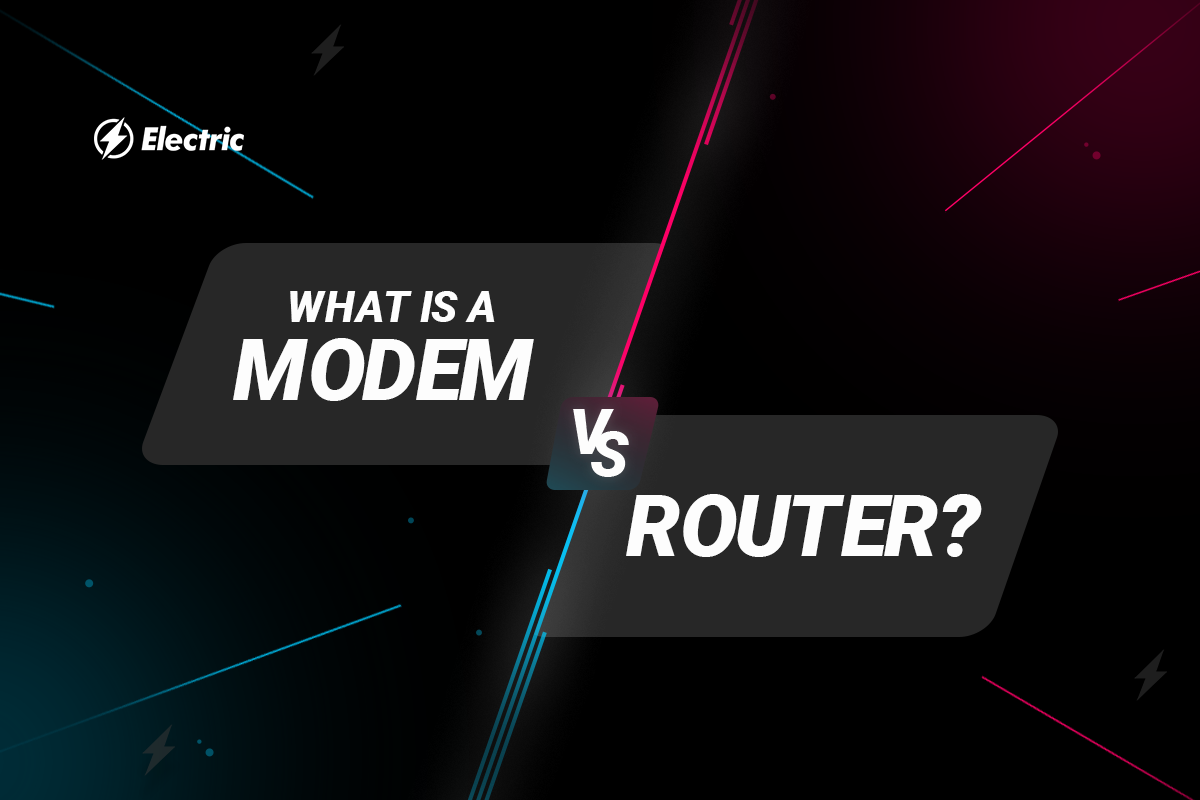
A lot has changed since the early days of the internet, particularly when it comes to how we access and connect to it. Today, it’s easy to forget that internet connection problems can still occur, and that they have the potential to bring your business to a halt.
For the most part, significant disruptions are rare – partly due to advances in technology and competition between various ISPs to provide reliable connections. However, as a small business owner or manager, you need to be prepared for all eventualities. Connection issues due to a modem or router problem can lead to costly downtime, so it’s important to understand the differences of a modem vs. a router.
What is a Modem?
A combination of two terms, modulation and demodulation, a modem is a device that performs two important tasks to enable your business to communicate with the outside world via the internet. It translates digital signals into analog signals (modulation) that can be sent via a cable. And, it converts data from a telephone cable or fiber optic to a digital signal that the computer can understand (demodulation). In other words, the modem is your gateway to the internet.
What is a Router?
Most businesses rely on numerous devices in the course of their operations. In the age of Bring Your Own Device (BYOD), it’s also not uncommon for employees to use more than one device. With a modem, you can only connect to a single computer. To make sure your workplace computers and employee devices can connect seamlessly with the internet, you’ll need a router.
As the name suggests, a router’s primary function is to route data packets to destination devices. In other words, a router helps you to create a local area network (LAN) for your business. When the router is connected to the modem, it allows devices connected to the LAN to access the internet.
Modem vs. Router: What are the Differences?
The differentiating factor between a modem vs. a router is that a modem connects you to the internet through your Internet Service Provider (or ISP), while the router allows you to share that internet connection to several devices, either using cables or wirelessly. The two pieces of hardware may look the same, but a router will always have many ports in comparison to a modem which usually has only two.
Today, several manufacturers or ISPs are combining these two pieces of hardware in one unit. While this may seem like a more minimalistic and compact design, it’s not always recommended for a business setting, which requires more flexibility and reliability as compared to home networks, where the 2-in-1 combo can work perfectly.
How to Choose a Business Router
The choice of router you use at your business can determine several things — speed, reliability, the number of devices you can connect to, Wi-Fi availability, and more. However, the most important of all, it also affects your security.
With cybercrime incidents on the rise, someone intruding on your network through a vulnerability in the router is something to avoid at all costs. When buying a business router, don’t just go for regular consumer options; consider purchasing a VPN router that provides an additional security layer for your corporate network.
Besides security, consider the following:
- Wired/wireless: While a wired network can work impeccably, a wireless connection capability offers employees much more flexibility. But, remember that distance and structures such as concrete walls affect the wireless connection.
- Model: Newer router models with the latest technology can provide faster speeds to support several devices without traffic jam problems.
- Network Priority Feature: Go for a router that allows you to prioritize crucial connections or devices over others. For example, a router that prioritizes voice and video traffic can make your virtual meeting experience seamless.
- Content Control: Your employees can be viewed as a weak link through which malicious programs can get into your devices. A router with filtering capability can avert this while also preventing employees from accessing high-risk websites.
How to Choose a Modem for Your Business
No matter the router you purchase, some key aspects of your internet connection are dependent on your modem and, ultimately, the ISP you go with. Most ISPs will encourage you to rent a modem from them, which may come with a router. However, you need to be careful as the hardware offered may not meet your requirements.
If the ISP doesn’t have the modem-router combination you want, the best option is to purchase your own third-party hardware. However, you should first check with the ISP to ascertain that the modem will flawlessly connect to the ISP. Another consideration is the speed of the modem. If you’re going for a third-party modem, make sure that it can match the router speeds.
How to Troubleshoot Modems and Routers
Once in a while, you may run into an internet-related problem due to a modem or router issue. One of the most common faults occurs when there is a loose or damaged cable. This is where you want to check first, especially the WAN cable.
Another common issue is where the software supporting the hardware malfunctions or is outdated. Always check that you’re running the latest firmware or schedule automatic updates for continuous updates whenever there is an update or patch.
If using Wi-Fi, you will want to appropriately position your router for it to broadcast the signal to the whole room. Alternatively, add an access point to rooms where the signal is weak.
Keeping Your Business Online
Modems and routers are a crucial part of keeping your business online. To learn more about ensuring the smooth running of your organizational technology, get in touch with Electric today. By outsourcing your IT, you can access expert advice, lightning fast support, and the solutions you need to power business growth.



